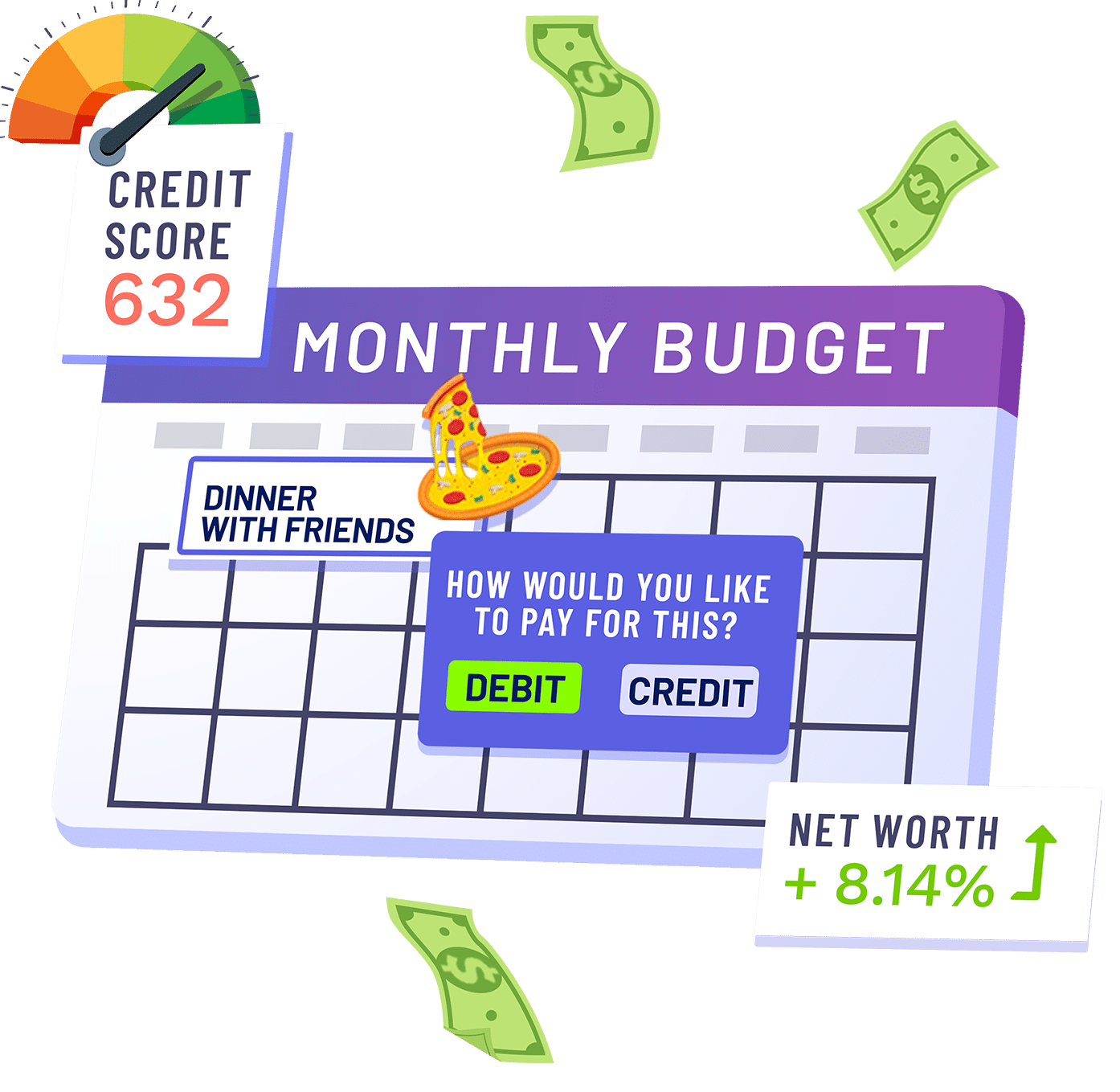| Spending and Saving |
| | | | | |
| Specify how monetary and non-monetary assets can contribute to net worth. |
Activity – Use the Net Worth Calculator
Lesson – What is Wealth?
Lesson – Building Wealth
| | | | | |
| Investigate changes in personal spending behavior that contribute to wealth building. |
Lesson – Budgeting
Lesson – Building Wealth
Lesson – Pay Yourself First
| | | | | |
| Differentiate between an expense that is tax deductible and one that is not. |
Lesson – Common Tax Deductions
Lesson – Common Tax Additions
Lesson – Taxation Overview
| | | | | |
| Devise a system to retain evidence of tax deductible expenditures. |
Lesson – What are Financial Records?
Lesson – Reconciling accounts
Lesson – Financing Records and Receipts
| | | | | |
| Investigate the records required to claim possible tax deductions or credits. |
Lesson – Common Tax Deductions
Lesson – Common Tax Additions
Lesson – Taxation Overview | | | | | |
| Compare the features and costs of online and mobile bill payment services offered by different institutions. |
Lesson – Automatic Payments
| | | | | |
| Compare the costs of cashing a check with various third parties, such as banks and credit unions, check-cashing services, and retail outlets. |
Lesson – Debit Cards
Lesson – Banks, Credit Unions, and Savings and Loans
| | | | | |
| Demonstrate how to schedule and manage bill payments. |
Lesson – Automatic Payments
| | | | | |
| Write a check |
Lesson – What is Money?
| | | | | |
| Reconcile the balance of a checking account and verify the balance of a debit account. |
Lesson – What is Money?
Lesson – Debit Cards
| | | | | |
| Explain how to verify printed and online account statements for accuracy. |
Budget Game – Core Component
| | | | | |
| Demonstrate how to use comparison shopping skills to buy or finance a major purchase. |
Lesson – Researching Shopping
| | | | | |
| Compare the advantages and disadvantages of owning a house versus renting a house. |
Activity – Use the Buy vs Lease Calculator
| | | | | |
| Evaluate specific charities based on purpose, management, outcomes or results, and reputation. |
Lesson – Charitable Giving
| | | | | |
| Credit and Debt |
Activity |
Long-Term Game |
Comprehensive Chapter |
Short Lesson |
Interactive Calculator |
Graded Assessment |
| Explain how credit card grace periods, methods of interest calculation (e.g., annual percentage rate) and fees affect borrowing costs. |
Lesson – Using Credit
Lesson – Credit Cards
| | | | | |
| Categorize the types of information needed when applying for credit. |
Lesson – Using Credit
Lesson – Credit Cards
Lesson – Credit Reports
| | | | | |
| Decide the most cost-effective loan option for paying for a car. |
Activity – Use the Car Loans Calculator
Lesson – Buying a car
| | | | | |
| Compare alternatives to loans as a means of paying for postsecondary education. |
Lesson – Work or Study
Lesson – Student Loans
| | | | | |
| Predict the potential consequences of deferred payment of student loans. |
Lesson – Student Loans
| | | | | |
| Differentiate between adjustable- and fixed-rate mortgages. |
Lesson – Mortgages
| | | | | |
| Explain the effect of debt on a person’s net worth. |
Budget Game – Core Component
Activity – Use the Net Worth Calculator
Lesson – Building Wealth
Lesson – What is Wealth?
| | | | | |
| Summarize online information about the Fair Credit Reporting Act. |
Lesson – Managing Debt
| | | | | |
| Explain the usefulness of credit reports to borrowers and to lenders. |
Lesson – Credit Reports
| | | | | |
| Give examples of permissible uses of a credit report other than granting credit. |
Lesson – Credit Reports
| | | | | |
| Identify the primary organizations that maintain and provide consumer credit records. |
Lesson – Credit Reports
| | | | | |
| Categorize the information in a credit report and how long it is retained. |
Lesson – Credit Reports
| | | | | |
| Investigate ways that a negative credit report can affect a consumer’s options. |
Lesson – Credit Reports
| | | | | |
| Outline the process of disputing inaccurate credit report data. |
Lesson – Credit Reports
| | | | | |
| Summarize factors that affect a particular credit scoring system. |
Lesson – Credit Reports
Lesson – Credit Cards
| | | | | |
| Predict how a credit score affects creditworthiness and the cost of credit. |
Lesson – Credit Reports
Lesson – Credit Cards
| | | | | |
| Develop a personal financial plan to manage debt, including working directly with lenders. |
Lesson – Managing Debt
Lesson – Consolidating Debt
Lesson – Debt Negotiation
Lesson – Debt Management Services
| | | | | |
| Examine or research the types of services that financial institutions or consumer credit counseling agencies offer for debt restructuring. |
Lesson – Managing Debt
Lesson – Consolidating Debt
Lesson – Debt Negotiation
Lesson – Debt Management Services
| | | | | |
| Investigate the purpose of bankruptcy and its possible negative effects on assets, employability, and credit cost and availability. |
Lesson – Bankruptcy
| | | | | |
| Investigate how student loan obligations differ from other kinds of debt. |
Lesson – Bankruptcy
Lesson – Student Loans
| | | | | |
| Summarize online information about the Equal Credit Opportunity Act. |
Lesson – Credit Cards
| | | | | |
| Research online information about consumer credit rights available from the Federal Trade Commission |
Lesson – Credit Cards
| | | | | |
| Give examples of how the Consumer Financial Protection Bureau protects borrowers and provides information about credit issues. |
Lesson – Credit Reports
| | | | | |
| Describe debtors’ and creditors’ rights related to wage garnishment and repossession when an overdue debt is not paid. |
Lesson – Managing Debt
| | | | | |
| Give examples of legal, illegal, and fraudulent debt collection practices covered by the Fair Debt Collection Practices Act. |
Lesson – Managing Debt
| | | | | |
| Employment and Income |
Activity |
Long-Term Game |
Comprehensive Chapter |
Short Lesson |
Interactive Calculator |
Graded Assessment |
| Revise a career plan that aligns with personal interests, financial goals, and desired lifestyle. |
Lesson – Career Development
| | | | | |
| Develop a résumé and cover letter for a specific job of interest |
Lesson – Using Keywords In Your Resume
| | | | | |
| Analyze employee benefits and explain why they are forms of compensation. |
Lesson – Employer and Employee Rights and Responsibilities
Lesson – Income and Compensation
| | | | | |
| Differentiate between required employer contributions and additional benefits that an employer might offer |
Lesson – Employer and Employee Rights and Responsibilities
| | | | | |
| Analyze the monetary and non-monetary value of employee benefits in addition to wages and salaries. |
Lesson – Employer and Employee Rights and Responsibilities
| | | | | |
| Calculate the future income needed to maintain a current standard of living. |
Activity – Use the Saving to be a Millionaire Calculator
Activity – Use the Compound Interest Calculator
Activity – Use the Net Worth Calculator
| | | | | |
| Identify typical sources of income in retirement. |
Lesson – Preparing For Retirement
| | | | | |
| Revise IRS form W-4 (Employee’s Withholding Allowance Certificate) to determine the optimal amount to withhold for personal income tax. |
Lesson – Tax Filing and the Form 1040
| | | | | |
| Analyze circumstances that would call for the adjustment of the income tax withholding allowance. |
Lesson – Common Tax Additions
Lesson – Common Tax Deductions
| | | | | |
| Examine the benefits of participating in employer-sponsored retirement savings plans and health care savings plans. |
Lesson – Preparing For Retirement
Lesson – Income and Compensation
| | | | | |
| Investing |
Activity |
Long-Term Game |
Comprehensive Chapter |
Short Lesson |
Interactive Calculator |
Graded Assessment |
| Compare strategies for investing as part of a comprehensive financial plan. |
Investing101 Certification
Lesson – Investing Strategies
Lesson – Building a Diversified Portfolio
Lesson – Budgeting
Lesson – Pay Yourself First
| | | | | |
| Describe the importance of various sources of income in retirement, including Social Security, employer-sponsored retirement savings plans, and personal investments. |
Lesson – Preparing For Retirement
Lesson – Income and Compensation
| | | | | |
| Differentiate between diversification and asset allocation. |
Lesson – Buidling a Diversified Portfolio
| | | | | |
| Compare fees for buying, owning, and selling stocks, bonds, and mutual funds. |
Stock Game – Core Component
| | | | | |
| Investigate reasons to use retirement
savings plans and health savings accounts. | Lesson – Life Insurance
Lesson – Preparing for Retirement | | | | | |
| Compare the advantages of taxable, tax deferred, and tax-advantaged investments for new savers, including Roth IRAs (individual retirement accounts) and employer-sponsored savings plans. |
Lesson – Life Insurance
Lesson – Preparing for Retirement
| | | | | |
| Give examples of how economic conditions and business factors affect the market value of a stock. |
Stock Game – Core Component
Investing101 Certification
Lesson – Understanding Price Movements
Lesson – The Business Cycle
| | | | | |
| Use various sources of information, including prospectuses, online resources, and financial publications to gather data about specific investments. |
Stock Game – Core Component
Investing101 Certification
Lesson – Investing Research
| | | | | |
| Devise evaluation strategies, including risk tolerance, for selecting investments that meet the objectives of a personal financial plan. |
Investing101 Certification
Lesson – Investing Strategies
Lesson – Buidling a Diversified Portfolio
Lesson – Risk
Activity – Use the Investment Return Calculator
| | | | | |
| Analyze the advantages and disadvantages of buying and selling investments through various channels including employer-sponsored retirement plans, investment advisors, brokerage firms, and direct purchase |
Stock Game – Core Component
Lesson – What is a Brokerage?
Lesson – How to Choose and Compare Stocks
Lesson – Investing Strategies
Lesson – Building a diversified portfolio
Lesson – Income and Compensation
| | | | | |
| Identify warning signs of investment fraud. |
Investing101 Certification
Lesson – Protecting Against Fraud
| | | | | |
| Identify steps and resources a consumer can take to prevent investment fraud. |
Lesson – Protecting Against Fraud
| | | | | |
| Identify the roles of the Securities and Exchange Commission, Washington Department of Financial Institutions, and Consumer Financial Protection Bureau in addressing investment fraud. |
Lesson – Audits and Fraud
| | | | | |
| Risk Management & Insurance |
Activity |
Long-Term Game |
Comprehensive Chapter |
Short Lesson |
Interactive Calculator |
Graded Assessment |
| Research insurance for the types of risks that young adults might face after graduation. |
Lesson – Renter’s Insurance
Lesson – Car Insurance
Lesson – Health Insurance
| | | | | |
| Investigate consequences of insurance fraud. |
Lesson – Life insurance
| | | | | |
| Calculate payment expected on an auto insurance claim after applying exclusions and deductibles. |
Lesson – Car Insurance
| | | | | |
| Identify the factors that influence the cost of homeowners’ insurance. |
Lesson – Home Owner’s Insurance
Lesson – Rental Agreements and Homeowner’s Associations
| | | | | |
| Analyze the factors that influence the cost of renters’ insurance. |
Lesson – Renter’s Insurance
| | | | | |
| Analyze the conditions under which it is appropriate for young adults to have health, disability, or life insurance. |
Lesson – Health Insurance
Lesson – Life Insurance
| | | | | |
| Investigate health, dental, and vision insurance coverage options |
Lesson – Health Insurance
| | | | | |
| Identify government programs that provide financial assistance for income loss due to illness, disability, or premature death. |
Lesson – Life Insurance
Lesson – Unemployment and other programs
| | | | | |
| Compare sources of health and disability insurance coverage, including employee benefit plans. |
Lesson – Income and Compensation
Lesson – Employer and Employee Rights and Responsibilities
Lesson – Health Insurance
| | | | | |
| Explain the purpose of long-term care insurance. |
Lesson – Health Insurance
| | | | | |
| Financial Decision-Making |
Activity |
Long-Term Game |
Comprehensive Chapter |
Short Lesson |
Interactive Calculator |
Graded Assessment |
| Consider how personal financial decisions might affect society. |
Lesson – Bankruptcy
Lesson – Work or Study
Lesson – Family Planning
Lesson – Charitable Giving
Lesson – The Business Cycle
| | | | | |
| Revise your definition of wealth based on personal values, priorities, and goals. |
Lesson – What is Wealth?
Lesson – Building Wealth
Lesson – Career Development
Activity – Use the Net Worth Calculator
| | | | | |
| Explain why an individual or household may want to consult with an attorney, financial planner, or tax advisor for financial advice or representation. |
Lesson – When to hire a tax professional
| | | | | |
| Research where to find credible sources of up-to-date information about consumer rights and responsibilities. |
Lesson – Consumer rights and responsibilities
| | | | | |
| Investigate sources of assistance in resolving consumer disputes. |
Lesson – Consumer rights and responsibilities
| | | | | |
| Predict how inflation will affect the outcomes of financial decisions, as well as the price of goods and services. |
Lesson – Inflation
Lesson – The Business Cycle
| | | | | |
| Analyze how sales and property taxes affect financial decisions, such as buying a car or a house. |
Lesson – Mortgages
Lesson – Sales Tax
Lesson – Taxation Overview
| | | | | |
| Develop a backup plan for a specific financial goal when circumstances change (e.g., job loss, illness, major gift, or inheritance). |
Lesson – Preparing for Spending Shocks
Lesson – Pay Yourself First
Lesson – Spending and Savings Plans
| | | | | |
| Analyze expenses and risks of alternative financing options (e.g., payday loans and credit card cash advances). |
Lesson – Short Term Financing
| | | | | |
| Develop a contingency plan to handle events (e.g., car breakdown or a phone loss) that might affect personal finances on short notice. |
Lesson – Preparing for Spending Shocks
Lesson – Pay Yourself First
Lesson – Spending and Savings Plans
| | | | | |
| Assess the importance of sharing financial goals and personal financial information with a partner before combining households. |
Lesson – Family Planning
| | | | | |
| Demonstrate how to negotiate the sales price of a major purchase, such as a car or a motorcycle. |
Lesson – Mortgages
Lesson – Buying a Car
Activity – Use the Buy vs Lease Calculator
Activity – Use the Home Budgeting Calculator
| | | | | |
| Summarize the factors that make a contract legal and binding. |
Lesson – What makes a contract valid?
| | | | | |
| Compare the terms of a credit card or other loan agreement. |
Lesson – Credit Cards
Lesson – Short-Term Financing
Lesson – Managing Debt
| | | | | |
| Summarize the terms of a homeowners’or renters’ insurance policy. |
Lesson – Renter’s Insurance
Lesson – Home Owner’s Insurance
Lesson – Rental Agreements and Homeowner’s Associations
| | | | | |
| Summarize the terms of a health insurance plan. |
Lesson – Health Insurance
| | | | | |
| Summarize local and state tenant and landlord rights and responsibilities that are covered in the terms of a standard rental lease agreement. |
Lesson – What makes a contract valid?
Lesson – Rental Insurance
| | | | | |
| Research the use of small claims court for the redress of a consumer dispute. |
Lesson – Consumer rights and responsibilities
| | | | | |
| Outline steps to resolve identity theft problems as recommended by the Federal Trade Commission and relevant financial institutions. |
Lesson – Protecting Against Fraud
| | | | | |
| Apply identity theft prevention strategies. |
Lesson – Protecting Against Fraud
| | | | | |
| List entities that have a right to request certain personal financial data. |
Lesson – Credit Reports
Lesson – Credit Cards
Lesson – Banks, Credit Unions, and Savings and Loans
| | | | | |
| Investigate consumer safeguards for mobile and online banking. |
Lesson – Protecting Against Fraud
| | | | | |
| Develop a personal financial plan or budget, including goals, spending and saving plan, investing plan, insurance plan, a net worth statement, and an estate plan. |
Lesson – Spending and Savings Plans
Lesson – Budgeting and Spending Strategies
Lesson – Building a Diversified Portfolio
Lesson – Preparing for Retirement
Lesson – Family Planning
Lesson – Planning Long Term Purchases
| | | | | |
| Devise a strategy to monitor the personal financial plan or budget and make modifications as needed for changing circumstances. |
Lesson – Preparing for spending shocks
Lesson – Budgeting
Lesson – Budgeting and Spending Strategies
| | | | | |
| List the main components of a simple will. |
Lesson – Simple and Living Wills
| | | | | |
| Identify how money and property will be distributed in one’s state of residence when a person dies without a valid will. |
Lesson – Simple and Living Wills
| | | | | |
| Explain the purpose of a durable power of attorney for health care (living will). |
Lesson – Life Insurance
Lesson – Simple and Living Wills
| | | | | |












